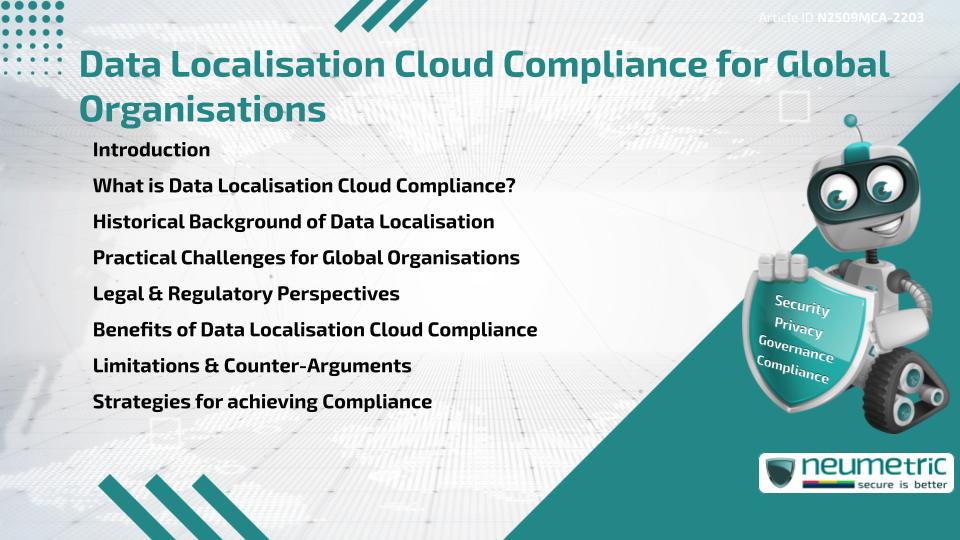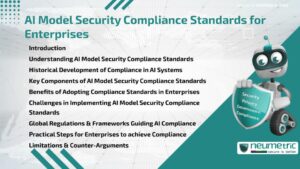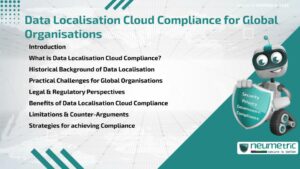Table of Contents
ToggleIntroduction
Data Localisation Cloud Compliance is a growing concern for Global organisations handling Sensitive Information across multiple Jurisdictions. It refers to the Legal & Operational requirement of storing & processing Data within specific geographic boundaries to meet Regulatory Standards. For Multinational Businesses, this creates both Opportunities & Challenges. Understanding its history, benefits, limitations & practical implications is essential for Compliance Officers, Cloud Architects & Business Leaders.
What is Data Localisation Cloud Compliance?
At its core, Data Localisation Cloud Compliance requires Companies to ensure that Personal or Regulated Data remains within a prescribed Country or Region. It often applies to Industries like Finance, Healthcare & Government Services where Data Privacy is critical. Global organisations must adapt their Cloud strategies to respect Local Laws while still maintaining Operational efficiency.
Historical Background of Data Localisation
The concept of Data Localisation began gaining traction in the early 2000s as nations sought to protect Digital Sovereignty. Governments feared that Foreign Entities could misuse Sensitive Information. Landmark Regulations such as the European Union’s General Data Protection Regulation [GDPR] & India’s evolving Data Protection laws have amplified the importance of Compliance. Over time, many countries introduced Sector-specific rules that reinforced the idea of keeping critical Data within their borders.
Practical Challenges for Global Organisations
For Global organisations, Data Localisation Cloud Compliance can be both costly & complex. Maintaining multiple Data Centers across Regions increases Operational expenses. Differences in Regulatory requirements between Countries often create conflicts, making it difficult to adopt a single unified approach. Moreover, Technological issues such as Data Transfer Latency & Interoperability with Global Systems complicate Compliance efforts.
Legal & Regulatory Perspectives
Governments see Localisation as a way to strengthen control over Data Security & Protect National interests. For example, Russia mandates that Personal Data of its citizens be stored locally, while China imposes strict Cross-border transfer rules. However, these laws vary widely & organisations often need Legal experts to interpret overlapping or conflicting rules. Resources like the OECD guidelines & World Bank research provide valuable context for interpreting these Frameworks.
Benefits of Data Localisation Cloud Compliance
Despite its complexity, Data Localisation Cloud Compliance offers clear benefits. It increases Trust among Consumers by ensuring that their Data is safeguarded under National Laws. It also helps reduce the Risk of Foreign Surveillance & Improves Accountability for Data Breaches. For certain organisations, Localisation may enhance performance by placing Servers closer to Users, improving Response times.
Limitations & Counter-Arguments
Critics argue that Localisation stifles innovation & creates Trade Barriers. Smaller Companies may struggle to afford multiple Local Data Centers, limiting their ability to scale Globally. Additionally, opponents claim that storing Data domestically does not necessarily guarantee protection from Cyberattacks.
Strategies for achieving Compliance
Global organisations can pursue a combination of strategies to meet Localisation demands. Hybrid Cloud models allow Sensitive Data to remain local while leveraging Global Cloud Services for other Operations. Partnerships with local Data Center providers can also ease the burden of Infrastructure Investments. Clear Compliance Roadmaps, informed by Privacy Rights Resources & Cross-border Legal Advice, help organisations stay aligned with Regulations.
Takeaways
Data Localisation Cloud Compliance is not just a Legal obligation but a strategic consideration for Global organisations. While it presents Financial & Operational challenges, it also strengthens Consumer Trust & National Data Security. Success lies in balancing Compliance with flexibility, using Hybrid Cloud Models, Legal Expertise & Robust Governance Practices.
FAQ
What is the main purpose of Data Localisation Cloud Compliance?
Its main purpose is to ensure that Sensitive or Regulated Data remains within specific Geographic Boundaries to meet National Laws.
Why is Data Localisation important for Global Organisations?
It helps companies build trust with Consumers, avoid Legal Penalties & align with International Data Protection Regulations.
Does Localisation guarantee better Data Security?
Not entirely. While it reduces exposure to foreign access, it does not eliminate Risks like Cyberattacks or Insider Threats.
Which Industries are most affected by Data Localisation Cloud Compliance?
Industries such as Healthcare, Finance, Telecommunications & Government Services face the strictest Localisation requirements.
How can organisations reduce Compliance costs?
They can adopt Hybrid Cloud Models, Partner with Local Providers & Invest in Automated Compliance Monitoring Tools.
References
- General Data Protection Regulation (GDPR)
- OECD Privacy Guidelines
- World Bank Digital Development Research
- Privacy International Resources
- Council on Foreign Relations – Data Governance
Need help for Security, Privacy, Governance & VAPT?
Neumetric provides organisations the necessary help to achieve their CyberSecurity, Compliance, Governance, Privacy, Certifications & Pentesting needs.
Organisations & Businesses, specifically those which provide SaaS & AI Solutions in the Fintech, BFSI & other regulated sectors, usually need a CyberSecurity Partner for meeting & maintaining the ongoing Security & Privacy needs & requirements of their Enterprise Clients & Privacy conscious Customers.
SOC 2, ISO 27001, ISO 42001, NIST, HIPAA, HECVAT, EU GDPR are some of the Frameworks that are served by Fusion – a SaaS, multimodular, multitenant, centralised, automated, CyberSecurity & Compliance Management system.
Neumetric also provides Expert Services for technical Security which covers VAPT for Web Applications, APIs, iOS & Android Mobile Apps, Security Testing for AWS & other Cloud Environments & Cloud Infrastructure & other similar scopes.
Reach out to us by Email or filling out the Contact Form…





